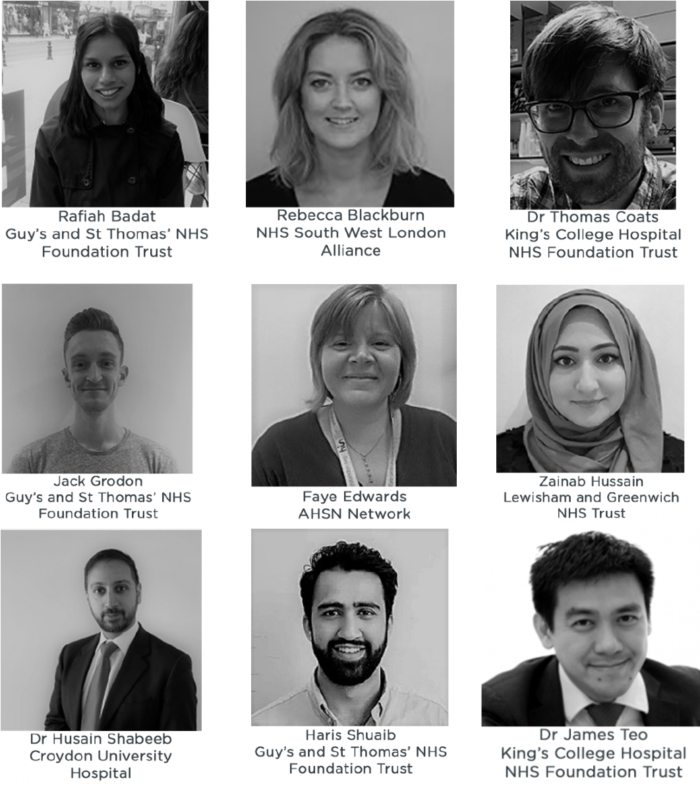Meet south London’s new Digital Pioneers
April 27, 2018Meet south London’s new Digital Pioneers
DigitalHealth.London has announced the launch of its prestigious 12-month Digital Pioneers Fellowship. It will support 23 ‘transformers’ (healthcare professionals from a range of disciplines), chosen from across London, in designing and leading transformation projects which are underpinned by digital innovation. Beginning in May 2018, the programme will help the chosen ‘transformers’ to accelerate their knowledge and capability, including supporting them in influencing, problem solving and business case development.
Nine of the 23 are from south London:
- Rafiah Badat (Speech and Language Therapist and Clinical Research Fellow, St George’s University Hospitals NHS Foundation Trust) is investigating the feasibility of a novel digital intervention for caseload children.
- Rebecca Blackburn (Commissioner, East Merton Transformation and Partnership Manager, NHS South West London Alliance) is working on a project which will double appointment offerings in Merton, by creating two hubs within GP Practices.
- Dr Thomas Coats (Haematology Registrar and Clinical Research Fellow, King’s College Hospital NHS Foundation Trust) has built a tool which digitises text-rich clinical data from multiple sources, will calculate complex prognostic scores. give diagnostic prompts and highlight significant data.
- Faye Edwards (National Programme Manager, AHSN Network) is leading a project advising AHSNs on an agreed approach regarding information governance and data collection, in order to demonstrate the impact of digital mobile ECG devices distributed to NHS providers via the AHSNs.
- Jack Grodon (Senior Specialist Musculoskeletal Physiotherapist/Fracture Clinic Team Lead, Guy’s and St Thomas’ NHS Foundation Trust) recently undertook a three-month project exploring the used of the app Physitrack to record patient exercise adherence, in addition to patient and staff satisfaction. The trial was successful, and he is hoping to implement Physitrack across his department.
- Dr Husain Shabeeb (Consultant Cardiologist and Cardiac Electrophysiologist, Croydon Health Services NHS Trust) is screening patients for atrial fibrillation using Alivecor Kardia in the community.
- Haris Shuaib (Magnetic Resonance Physicist, Guy’s and St Thomas’ NHS Foundation Trust) is developing an AI-driven medical imaging quality assurance web application. His ambition is to host it on a cloud-hosting service as a community resources for radiology departments in the NHS, allowing them to contribute test images for performing quality analysis on their clinical imaging equipment.
- Dr James Teo (Consultant Neurologist, King’s College Hospital NHS Foundation Trust) is increasing patient safety by developing dashboards for operational management of infections, such as influenza and norovirus outbreaks.

Digital transformations are already vital within the public healthcare sector. The need for these skills is only set to increase, as our population ages and increases, with complex and diverse health needs, and as new, exciting (but sometimes difficult to spread) technologies become available and affordable.
Here’s why we love the project:
It will bring like-minded Digital Transformation Pioneers together
It takes a lot of patient, trouble-shooting and solving, training, and unfortunately, meetings, to make even small-scale changes in the NHS. In their January 2018 report, ‘Adoption and spread of innovation in the NHS‘, King’s Fund described the decision to introduce just one innovation in the NHS as creating a ‘domino effect’ – becoming, “in short, a lengthy period of iterative testing and refinement”. The eight case studies that the report draws upon are proof of the arduous nature of implementing change. Implementing new digital solutions means developing new methods, building new habits, breaking from the status quo, and – as is very often needed with any innovation – changing stubborn mind-sets. Throw in that this is within a complex system and an organisation which is 70 years old this year – and it’s easy to see that drive and passion is needed.
Programmes like Digital Transformation Pioneers put all that drive and passion into a room together – with experts who can create new, exciting possibilities. It provides a great support network for those who are attempting their digital transformation project.
It encourages wider collaboration
When organisations fail to collaborate and to communicate with each other on a regular basis, it leaves ample room for wastage and the reinventing of the wheel … over, and over, and over again.
Collaboration across London creates a better environment for all aspects of achieving fantastic patient care. The sharing of ideas – even ones as simple as Croydon University Hospital’s fall initiative (asking patients which side of the bed they prefer to get out of, in order to dramatically reduce falls) or the roll-out of new technologies, for example, via the new ITP – is a catalyst for positive change. We know that collaborative cultures create better conditions for research, learning and patient care. Schemes like the Digital Pioneer Fellowship encourage wider collaboration beyond the Fellows themselves.
Helping people to get things done
Anyone who has tried to attempt to have a hobby on top of their regular day-job can tell you that it’s a challenge. Imagine trying to instigate a large-scale, transformation project which encourages use of new digital technologies, innovations and processes whilst also coping with the ever-challenging budget changes, population increases, and the wide range of additional issues that can occur in a busy health and care environment.
Through support and skills training, the Digital Pioneer Fellowship will quite simple provide the support these ‘Transformers’ to get things done. If they hit a road-block, the Fellowship team will be there to help them through it. If time is against them, having the protected time to take part in the Fellowship modules could make a huge difference.
Resilient, skilled digital leaders need all of the support we can give them. We wish them the best of luck and hope that they enjoy the programme.
If you want to find out more about the Digitial Pioneers Fellowship, visit DigitalHealth.London’s website.